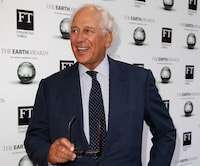Evelyn de Rothschild, who controlled the British wing of his family’s empire for nearly three decades, wielding his name and immense wealth in banking, government and at Buckingham Palace, where he advised Queen Elizabeth II on financial matters, died Nov. 7 at his home in London. He was 91.
Evelyn de Rothschild, banking heir and adviser to the queen, dies at 91

Mr. Rothschild took control of N.M. Rothschild & Sons, the family’s London bank, in 1976, and operated it — both in strategy and tone — in the spirit of his forefathers. As global banking conglomerates emerged with faceless bankers engaging in risky hedging strategies, Mr. Rothschild took a more cautious route, executing corporate finance deals forged through personal relationships.
“The humanistic side of banking has gone out,” Mr. Rothschild told the Financial Times in 2017. “You know the name of your doctor but not the name of your bank manager. There are certain things in life where you have to have a human relationship.”
Though his control of N.M. Rothschild placed him at the center of power on two continents — the queen knighted him in 1989 and he spent one of his three honeymoons in President Bill Clinton’s White House — Mr. Rothschild was somewhat exasperated by modern banking.
“Maybe we should go back to the days of semaphore,” he once said, referring to a system of sending codes by flags. “Think how lovely a time it was, with horse and cart.”
Mr. Rothschild was speaking wistfully, in a way, about the legacy of his ancestors. The Rothschild banking dynasty dates to back to the mid-18th century in Frankfurt, Germany, where Mayer Amschel Rothschild turned a rare coin business into a financial services firm. He sent his five sons to major cities throughout Europe to lay the framework for a multinational empire.
Mr. Rothschild’s great-great-grandfather Nathan Mayer Rothschild arrived in England in 1798, working as a textile merchant and eventually founding a bank. The family’s role in English life was immense. The Rothschilds financed the British Army in the Napoleonic Wars and later the purchase of the Suez Canal.
“Strictly in terms of their combined capital, the Rothschilds were in a league of their own,” wrote historian Niall Ferguson in his book “The House of Rothschild.” “The twentieth century has no equivalent: not even the biggest of today’s international banking corporations enjoys the relative supremacy enjoyed by the Rothschilds in their heyday.”
Evelyn Robert Adrian de Rothschild was born in London on Aug. 29, 1931. His father was, of course, a banker, and his mother was a socialite who tooled around in the family’s stable of fancy cars, which included a Rolls-Royce and a Bugatti.
Mr. Rothschild initially went to boarding school. To escape the German bombing of England during World War II, he was evacuated to live with family in New York, where he worked at a drugstore that allowed him unlimited consumption of chocolate, giving him a permanent sweet tooth that led him to open a luxury chocolatier later in life.
After the war, Mr. Rothschild attended the University of Cambridge but didn’t graduate. His ambition was not to change the family business. Mr. Rothschild played polo, dated an abundant assortment of women and raced horses.
In 1961, after his father became ill and couldn’t run the family bank anymore, Mr. Rothschild joined the family business and rose to chairman in 1976. Competing against much bigger banks, Mr. Rothschild managed to grow the firm’s assets from 40 million to 4.6 billion pounds, according to the Financial Times.
Standing 6-foot-4, Mr. Rothschild was an imposing figure known for holding a firm grasp on both the business and his family’s legacy. Working closely with the Conservative Party, including Prime Minister Margaret Thatcher, Mr. Rothschild and his firm organized the government sale of British Gas and the privatization of oil, gas and electric companies.
In addition to its government work, N.M. Rothschild was a significant player in mergers and acquisitions. Mr. Rothschild insisted on a personal touch in the bank’s dealings.
“What I care about is strategy,” Mr. Rothschild told the Financial Times in 1996. “The Rothschild family feels that if its name is on the door, it has a responsibility to see that it is properly managed.”
Mr. Rothschild’s 1966 marriage to Jeannette Bishop, a fashion model, ended in divorce in 1971. Two years later, he married Victoria Lou Schott, a student at the Columbia University Graduate School of Business. They had three children, before divorcing in 2000. That same year, he married Lynn Forester, a New York businesswoman who was introduced to him by Henry Kissinger, their mutual friend. The couple spent one of their honeymoon nights in the Lincoln Bedroom of the White House.
Survivors include his wife and three children, the Rothschild Archive said.
Throughout his life, Mr. Rothschild served on numerous boards, including the Economist, and he supported philanthropic causes in the arts, health care and the environment. He was particularly passionate about elephants, setting up a charity for their preservation with Mark Shane, the late travel writer and brother of Camilla, Queen Consort.
Mr. Rothschild, whose iPhone wallpaper was a photo of an elephant, declined many interview requests, but he was almost always available to talk about his childhood love of chocolate, which sweetened his war years away from home.
“Nearly everyone can afford chocolate. You can have a chocolate bar, a chocolate ice cream, a hot chocolate. It makes people happy,” he told the Financial Times in 2017. “I feel strongly about that.”






